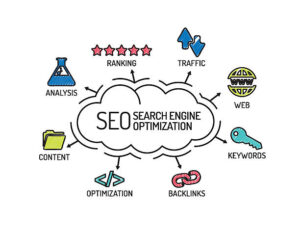WordPress SEO Optimization: Improve Your Website’s Search Engine Rankings
In today’s digital age, appearing on the first page of search engine results is crucial for any website’s success. WordPress SEO optimization can significantly improve your website’s search engine rankings, driving more traffic and enhancing online visibility. Whether you’re running a personal blog, an e-commerce store, or a business site, optimizing your WordPress website for search engines is essential to stay competitive.
Why SEO is Crucial for WordPress Websites
WordPress, known for its flexibility and ease of use, is already SEO-friendly right out of the box. However, to maximize your site’s potential, you must incorporate several WordPress SEO optimization strategies. These techniques help improve your site’s structure, content relevance, and overall performance, ensuring that search engines rank it higher for your target keywords.
Benefits of Optimizing Your WordPress Site for SEO
There are numerous benefits to focusing on WordPress SEO optimization, and they all contribute to better rankings, increased organic traffic, and an improved user experience. Let’s dive into the key advantages:
1. Improved Search Engine Visibility
Effective SEO practices help search engines like Google understand your content better, improving the chances of your site appearing at the top of search results. Higher rankings lead to more organic traffic, which is critical for attracting potential customers.
2. Better User Experience
A well-optimized site isn’t just about appeasing search engines. SEO also focuses on enhancing user experience by improving site speed, mobile-friendliness, and navigation. A faster, easy-to-navigate site increases engagement, decreases bounce rates, and improves conversions.
3. Increased Organic Traffic
By targeting the right keywords, you can attract more visitors interested in what you offer. SEO allows you to optimize your site’s content to meet user intent, ensuring that your site attracts the right audience.
For a detailed guide on improving search visibility, check out this resource.

Top WordPress SEO Optimization Strategies
Optimizing your WordPress site for SEO requires a mix of on-page and off-page strategies. Below are some essential practices to help you get started.
1. Use SEO-Friendly WordPress Themes
Your site’s theme plays a critical role in SEO. A well-coded and responsive theme ensures faster load times and a mobile-friendly design, both of which are ranking factors for search engines. When choosing a theme, make sure it’s optimized for speed, responsive across devices, and compatible with popular SEO plugins.
2. Optimize Your Permalinks
WordPress allows you to customize your permalinks, which are the URLs for your site’s posts and pages. SEO-friendly URLs are short, descriptive, and include your target keyword. To optimize permalinks, navigate to Settings > Permalinks and choose a structure that enhances both user experience and SEO.
3. Leverage SEO Plugins
One of the best things about WordPress is its extensive range of plugins. For SEO, Yoast SEO and All in One SEO Pack are two of the most popular plugins. These tools help you optimize your meta tags, create XML sitemaps, and ensure that your content is ready for search engines.
To learn more about WordPress SEO plugins, visit Yoast’s official page.
4. Optimize Title Tags and Meta Descriptions
Your page titles and meta descriptions are crucial elements of WordPress SEO optimization. They inform both search engines and users what your content is about. Include your primary keyword in both the title and meta description, but ensure it reads naturally. A well-crafted meta description can improve click-through rates, driving more traffic to your site.
5. Create High-Quality, Keyword-Optimized Content
Content remains king in SEO. Ensure that your content is high-quality, relevant, and optimized for the keywords you’re targeting. Avoid keyword stuffing, and instead, focus on providing value to your audience. Use header tags (H1, H2, H3) to organize your content, making it easier for both users and search engines to read.
6. Improve Site Speed
Page speed is a significant ranking factor for SEO. Slow websites not only frustrate users but also lead to lower rankings. You can improve your site’s speed by optimizing images, using a caching plugin, and choosing a reliable hosting provider.
For more tips on speeding up your WordPress site, visit this guide.
WordPress SEO Best Practices
To stay ahead of the competition, follow these additional SEO best practices:
- Ensure your site is mobile-friendly.
- Use internal linking to connect relevant content.
- Regularly update old content to keep it fresh.
- Optimize images with descriptive alt text.
- Build high-quality backlinks to your site.
If you need professional assistance with WordPress SEO optimization, contact Digitor for expert guidance.
Conclusion
WordPress SEO optimization is a powerful tool that can dramatically improve your search engine rankings, attract more organic traffic, and enhance your website’s overall user experience. By implementing the right strategies—such as optimizing your themes, plugins, and content—you’ll position your site for long-term success in the digital landscape.
For further reading, consider exploring Smashing Magazine for design tips and trends, or visit AIGA for professional design resources and insights.
Explore more related articles to deepen your understanding and make informed choices about graphic design techniques
WordPress Website Developer: Expert Solutions for Your Online Presence
Custom WordPress Development: Tailored Websites for Your Business






